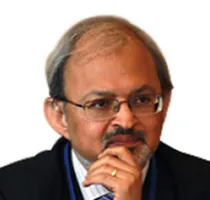-
CENTRES
Progammes & Centres
Location
There are growing tensions between countries traditionally considered partners. For those who love binaries — is this the new bipolarity?

Address by ORF Chairman at the Primakov Readings 2018, Moscow.
After hearing my fellow panelists I get the distinct feeling that bipolarity is dead, long live bipolarity.
We know we live in a complicated world — yet binaries still seduce us — bipolarity is ingrained in our neurons. It is the track on which our train of thoughts runs fastest. In a world defined by how our leaders and we perceive — in a world defined by Twitter politics and microphone diplomacy, the simple stories and conspiracies spawned by a bipolar world become our reality.
Make one side and good the other evil and it is easy to cajole, seduce, or browbeat and sanction others into submission — to accept one over the other.
But that very fact also makes it a myth — making it all about the rendering of a story to exert power and control.
"In a world defined by how our leaders and we perceive — in a world defined by Twitter politics and microphone diplomacy, the simple stories and conspiracies spawned by a bipolar world become our reality."
So let us deconstruct this bipolarity.
In present times, our imagination of bipolarity draws from the days of the good old Cold War. It defined the world order post World War II. There are those who believe that it even led to a far more stable and therefore by inference also a happier and contented world. Some believe in its efficacy so much that they are ever willing to keep on breathing new life into the old conflict.
But then the fact is that where you sit determines what you see.
For many seeing the world from the perspective of the conflict in Syria or in the Ukraine that old familiar bipolar world of the Cold War stands resurrected. But move South into Yemen and bipolarity takes on a very different hue — it is Iran and Saudi Arabia the two regional hegemons slugging it out.
Move East and the poles shift yet again. The power struggle in the Indo-Pacific dresses up China in the garb of the other pole.
The Trump Administration has even described China as a “revisionist power”. The interactions and altercations between the US and China continue to spill over into the global system — the possibility of a “trade war” between the two states is still giving shivers to global markets every other day.
But the fact is that even as they may be the world’s most important power centers, its strongest and biggest economic powers, none has the capacity to influence global outcomes singlehandedly.
"Global warming is passé, what we are experiencing is a global sauna. The poles are melted and adrift."
So let us move from nations to the zeitgeist and examine the emergence of a different kind of polarity. We have been observing the rise of a new nationalism that is causing deep polar divides in societies to become the defining mood. In country after country we are seeing polarisation within societies. Issues like globalisation, free trade, who is stealing whose jobs are leaving deeply divided societies. The divisions are come to the stage where domestic politics is preventing any possibility of there ever being a consensus on foreign policy. We are seeing tensions between countries traditionally considered partners. For those who love binaries — Is this the new bipolarity?
The point is that post World War II, as empires became history, the system of global governance moved onto building a different kind of empire. This was the empire of norms. These norms came to be administered through a whole host of economic and political institutions. And the high table was dominated by the cross-Atlantic consensus — a consensus that defined common interests and values — a consensus that eventually came to deify the principles of globalisation and free trade.
By the turn of the century the belief that the norms and institutions promoting globalisation and free trade were creating win-win synergies for all had become an article of supreme faith. With it also came the conviction that prosperity and stability across the world would evolve as an inevitable function of this global interdependence.
There had been countries which occupied the high table, there were others who aspired to be there. And then there had been the pariahs, countries who were excluded.
But global value chains were now integrating the pariahs into the new world order. China was profiting and thereby accepting the underlying logic of globalisation. In the process it was becoming deeply invested across the same common institutions. So deeply invested that it sought greater bargaining power within them even if it meant doing so by creating competing institutions.
Except that this fairy tale world, like all fairy tales had a dark side, a soiled side — a hidden underbelly that was exposed by two events. The first was 9/11 and the trumped up war on terror — a war trumped up well before Trump was anywhere on the scene. It was a war put together by a coalition of convenience without even the presence of multilateral sanction. The norms and values based liberal world order not only accepted that war but cheered it on — even if it meant burying multilateralism in the ruins of the twin towers.
The second event was 2008. Central Banks got rather carried away by Green’s myth about how “increasingly complex financial instruments were contributing to the development of a far more flexible, efficient, and resilient financial system.” 2008 dealt a body blow to the notion that financial markets worked best when they were allowed to self-regulate. And the bail out of the financial system saw Atlantic countries coming together to coordinate and push together some of the most interventionist policies ever seen by the world.
Except that this fairy tale world, like all fairy tales had a dark side, a soiled side — a hidden underbelly that was exposed by two events. The first was 9/11 and the trumped up war on terror — a war trumped up well before Trump was anywhere on the scene.. The second event was 2008. Central Banks got rather carried away by Green’s myth about how “increasingly complex financial instruments were contributing to the development of a far more flexible, efficient, and resilient financial system.”
Truly speaking the interrogation of the free open trading systems shaping global integration over the last several years began at that time — again it began well before Trump. And this happened in the very capitals that had promoted these principles in the first place. Trump in more ways than one was only the consequence, the symptom. He was never the cause. Trump only brought some third degree methods into the style of interrogation — began subjecting it to waterboarding. The G7 the G20, bodies that were meant to promote integration of both trade and finance suddenly lacked consensus to promote this agenda anymore.
The Atlantic consensus had broken down and with it the empire of norms created there under. And with this breakdown issues such as climate change, cyber governance, trade, Iran, North Korea, and nuclear non-proliferation are again becoming more contentious.
A world of a la carte confrontation or coalescence — fluid coalitions framed by thematic alliances and theme based confrontations can only result in an alphabet soup of plurilateral coalitions.
The US might see India as a pivotal partner in the Indo-Pacific but India will continue to maintain its relationship with Russia, talk to China in the BRICS and participate in institutions that might be antithetical to American interests, like the Shaghai Cooperation Organisation.
Read reports coming out of WTO negotiations — it is easy to conclude that India will remain fiercely pitted against the US and EU.
In this new world, forget middle powers like Australia, Japan India, even smaller powers are no longer willing to concede to rules or norms conceptualised without their participation. They want to contest, they want to write the new norms in their own fashion.
"The march of technology is demanding a more globalised world, it demands more global governance not less. Yet nations are moving into a separate orbit."
On the one hand we have technologies that are universalising both the threats as well as the opportunities mankind faces. The march of technology is demanding a more globalised world, it demands more global governance not less. Yet nations are moving into a separate orbit.
Technology meanwhile is catalysing dramatic political and economic and social transformations. Redefining society, commerce, businesses and human interaction.
The instantaneous availability of information is disrupting politics and political communication, social aggregation, markets and economic decision making. It is challenging not only notions of sovereignty and territory for nations but also of individual identities and disrupting communities.
A middle class engineering student in a European city discovers purpose and community in joining a radical group in West Asia. That becomes his motivation, his identity.
We have women with no access to electricity finding common cause with anti-nuclear protest movements in Germany.
Power has certainly become more diffused, but the outcome is beyond being bipolar or even multipolar.
The fact is that the international order itself is undergoing far deeper transformations. Yes the shape of those transformations is yet to emerge but we struggle to fashion a new project. The jury is still out on whether and whither we will succeed.
Global warming is passé, what we are experiencing is a global sauna. The poles are melted and adrift. It is become increasingly difficult to define their shape and make out who or what they were. The new world therefore is neither simply bipolar or multipolar.. rather to come back to my opening because binaries always seduce us — because bipolarity is ingrained in our neurons — we find ourselves in a world of multiple polarities.
The views expressed above belong to the author(s). ORF research and analyses now available on Telegram! Click here to access our curated content — blogs, longforms and interviews.

Sunjoy Joshi has a Master’s Degree in English Literature from Allahabad University, India, as well as in Development Studies from University of East Anglia, Norwich. ...
Read More +